Hospitality Operations: Pricing, Demand, and Analysis Report
VerifiedAdded on 2020/12/31
|13
|4028
|86
Report
AI Summary
This report provides a comprehensive analysis of hospitality operations management, focusing on various aspects crucial for success in the industry. It begins by analyzing the nature of hospitality products and services, particularly within the context of Hilton Hotel, and evaluates the factors influencing demand, including social, economic, and pricing elements. The report then delves into customer profiles and expectations, comparing the needs of leisure, corporate, and conference travelers. Furthermore, it examines the factors affecting average spending power in the hospitality business, such as income levels, status, and economic situations. The report also explores the key stages in product and service development, assessing opportunities and constraints, and evaluating different merchandising opportunities. Finally, it evaluates different pricing methods used in the hospitality sector and analyzes factors affecting revenue generation and profitability. The report concludes with an application of performance measures and appraisal techniques, determining their limitations and usefulness, and proposing approaches to business analysis and planning appropriate for hospitality operations.
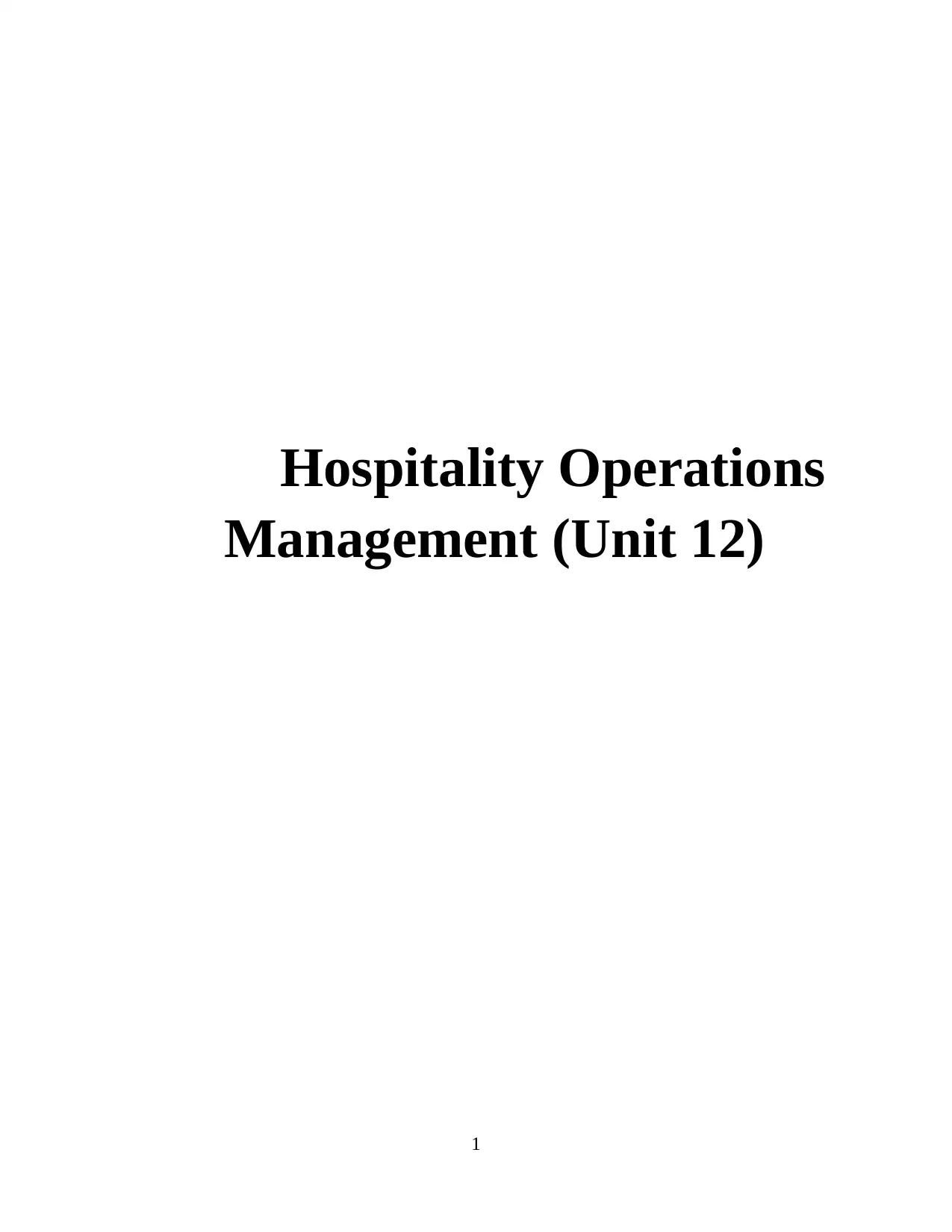
Hospitality Operations
Management (Unit 12)
1
Management (Unit 12)
1
Paraphrase This Document
Need a fresh take? Get an instant paraphrase of this document with our AI Paraphraser
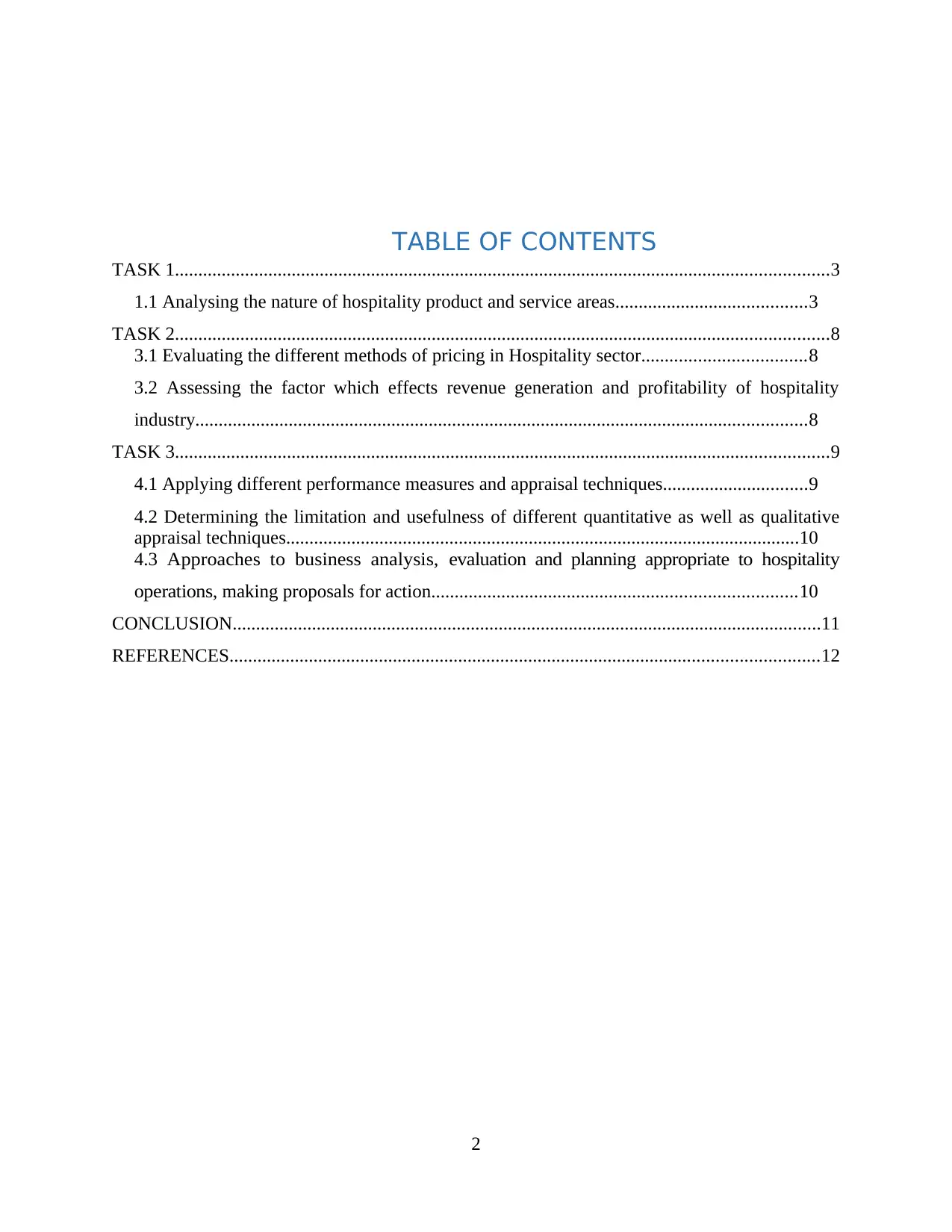
TABLE OF CONTENTS
TASK 1............................................................................................................................................3
1.1 Analysing the nature of hospitality product and service areas.........................................3
TASK 2............................................................................................................................................8
3.1 Evaluating the different methods of pricing in Hospitality sector...................................8
3.2 Assessing the factor which effects revenue generation and profitability of hospitality
industry...................................................................................................................................8
TASK 3............................................................................................................................................9
4.1 Applying different performance measures and appraisal techniques...............................9
4.2 Determining the limitation and usefulness of different quantitative as well as qualitative
appraisal techniques..............................................................................................................10
4.3 Approaches to business analysis, evaluation and planning appropriate to hospitality
operations, making proposals for action..............................................................................10
CONCLUSION..............................................................................................................................11
REFERENCES..............................................................................................................................12
2
TASK 1............................................................................................................................................3
1.1 Analysing the nature of hospitality product and service areas.........................................3
TASK 2............................................................................................................................................8
3.1 Evaluating the different methods of pricing in Hospitality sector...................................8
3.2 Assessing the factor which effects revenue generation and profitability of hospitality
industry...................................................................................................................................8
TASK 3............................................................................................................................................9
4.1 Applying different performance measures and appraisal techniques...............................9
4.2 Determining the limitation and usefulness of different quantitative as well as qualitative
appraisal techniques..............................................................................................................10
4.3 Approaches to business analysis, evaluation and planning appropriate to hospitality
operations, making proposals for action..............................................................................10
CONCLUSION..............................................................................................................................11
REFERENCES..............................................................................................................................12
2
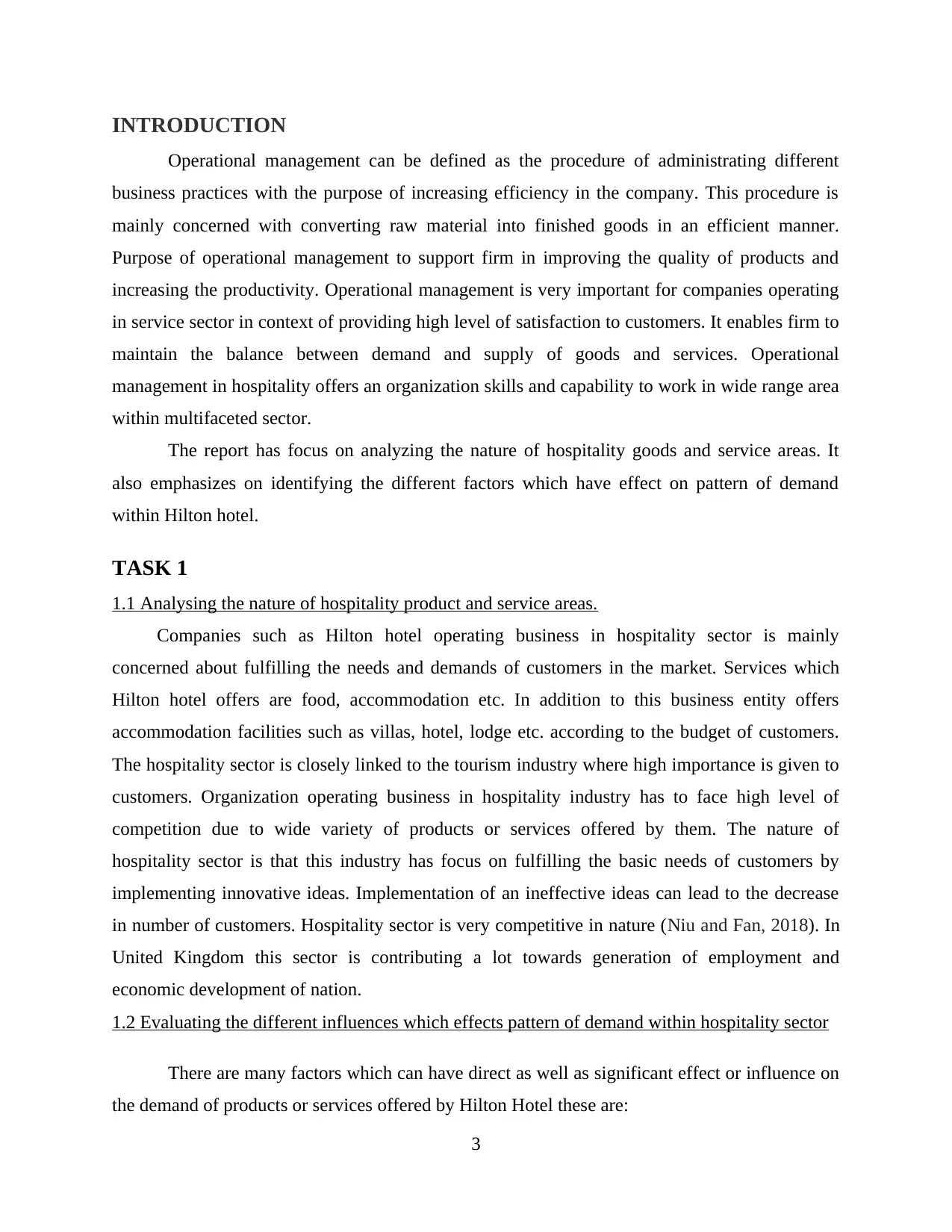
INTRODUCTION
Operational management can be defined as the procedure of administrating different
business practices with the purpose of increasing efficiency in the company. This procedure is
mainly concerned with converting raw material into finished goods in an efficient manner.
Purpose of operational management to support firm in improving the quality of products and
increasing the productivity. Operational management is very important for companies operating
in service sector in context of providing high level of satisfaction to customers. It enables firm to
maintain the balance between demand and supply of goods and services. Operational
management in hospitality offers an organization skills and capability to work in wide range area
within multifaceted sector.
The report has focus on analyzing the nature of hospitality goods and service areas. It
also emphasizes on identifying the different factors which have effect on pattern of demand
within Hilton hotel.
TASK 1
1.1 Analysing the nature of hospitality product and service areas.
Companies such as Hilton hotel operating business in hospitality sector is mainly
concerned about fulfilling the needs and demands of customers in the market. Services which
Hilton hotel offers are food, accommodation etc. In addition to this business entity offers
accommodation facilities such as villas, hotel, lodge etc. according to the budget of customers.
The hospitality sector is closely linked to the tourism industry where high importance is given to
customers. Organization operating business in hospitality industry has to face high level of
competition due to wide variety of products or services offered by them. The nature of
hospitality sector is that this industry has focus on fulfilling the basic needs of customers by
implementing innovative ideas. Implementation of an ineffective ideas can lead to the decrease
in number of customers. Hospitality sector is very competitive in nature (Niu and Fan, 2018). In
United Kingdom this sector is contributing a lot towards generation of employment and
economic development of nation.
1.2 Evaluating the different influences which effects pattern of demand within hospitality sector
There are many factors which can have direct as well as significant effect or influence on
the demand of products or services offered by Hilton Hotel these are:
3
Operational management can be defined as the procedure of administrating different
business practices with the purpose of increasing efficiency in the company. This procedure is
mainly concerned with converting raw material into finished goods in an efficient manner.
Purpose of operational management to support firm in improving the quality of products and
increasing the productivity. Operational management is very important for companies operating
in service sector in context of providing high level of satisfaction to customers. It enables firm to
maintain the balance between demand and supply of goods and services. Operational
management in hospitality offers an organization skills and capability to work in wide range area
within multifaceted sector.
The report has focus on analyzing the nature of hospitality goods and service areas. It
also emphasizes on identifying the different factors which have effect on pattern of demand
within Hilton hotel.
TASK 1
1.1 Analysing the nature of hospitality product and service areas.
Companies such as Hilton hotel operating business in hospitality sector is mainly
concerned about fulfilling the needs and demands of customers in the market. Services which
Hilton hotel offers are food, accommodation etc. In addition to this business entity offers
accommodation facilities such as villas, hotel, lodge etc. according to the budget of customers.
The hospitality sector is closely linked to the tourism industry where high importance is given to
customers. Organization operating business in hospitality industry has to face high level of
competition due to wide variety of products or services offered by them. The nature of
hospitality sector is that this industry has focus on fulfilling the basic needs of customers by
implementing innovative ideas. Implementation of an ineffective ideas can lead to the decrease
in number of customers. Hospitality sector is very competitive in nature (Niu and Fan, 2018). In
United Kingdom this sector is contributing a lot towards generation of employment and
economic development of nation.
1.2 Evaluating the different influences which effects pattern of demand within hospitality sector
There are many factors which can have direct as well as significant effect or influence on
the demand of products or services offered by Hilton Hotel these are:
3
⊘ This is a preview!⊘
Do you want full access?
Subscribe today to unlock all pages.

Trusted by 1+ million students worldwide
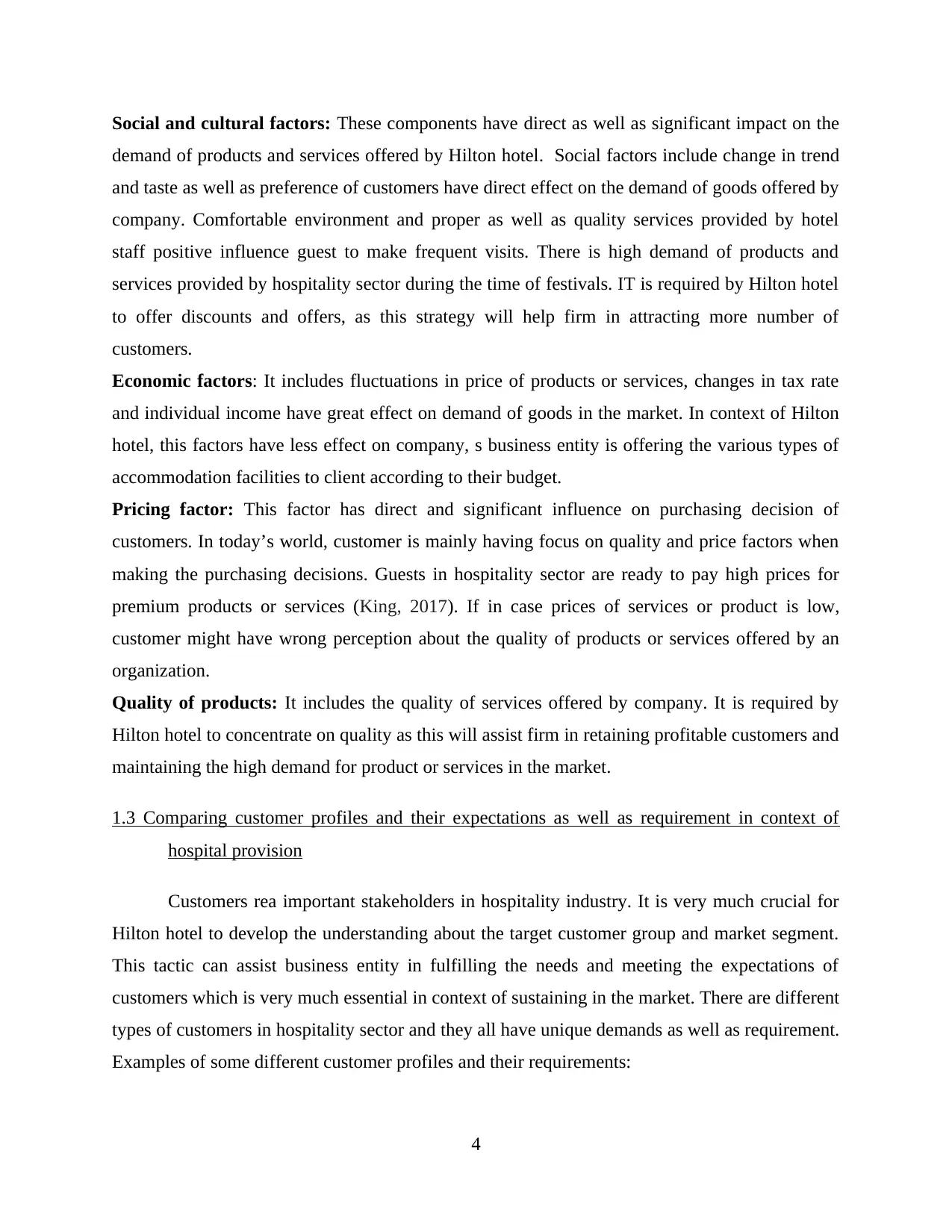
Social and cultural factors: These components have direct as well as significant impact on the
demand of products and services offered by Hilton hotel. Social factors include change in trend
and taste as well as preference of customers have direct effect on the demand of goods offered by
company. Comfortable environment and proper as well as quality services provided by hotel
staff positive influence guest to make frequent visits. There is high demand of products and
services provided by hospitality sector during the time of festivals. IT is required by Hilton hotel
to offer discounts and offers, as this strategy will help firm in attracting more number of
customers.
Economic factors: It includes fluctuations in price of products or services, changes in tax rate
and individual income have great effect on demand of goods in the market. In context of Hilton
hotel, this factors have less effect on company, s business entity is offering the various types of
accommodation facilities to client according to their budget.
Pricing factor: This factor has direct and significant influence on purchasing decision of
customers. In today’s world, customer is mainly having focus on quality and price factors when
making the purchasing decisions. Guests in hospitality sector are ready to pay high prices for
premium products or services (King, 2017). If in case prices of services or product is low,
customer might have wrong perception about the quality of products or services offered by an
organization.
Quality of products: It includes the quality of services offered by company. It is required by
Hilton hotel to concentrate on quality as this will assist firm in retaining profitable customers and
maintaining the high demand for product or services in the market.
1.3 Comparing customer profiles and their expectations as well as requirement in context of
hospital provision
Customers rea important stakeholders in hospitality industry. It is very much crucial for
Hilton hotel to develop the understanding about the target customer group and market segment.
This tactic can assist business entity in fulfilling the needs and meeting the expectations of
customers which is very much essential in context of sustaining in the market. There are different
types of customers in hospitality sector and they all have unique demands as well as requirement.
Examples of some different customer profiles and their requirements:
4
demand of products and services offered by Hilton hotel. Social factors include change in trend
and taste as well as preference of customers have direct effect on the demand of goods offered by
company. Comfortable environment and proper as well as quality services provided by hotel
staff positive influence guest to make frequent visits. There is high demand of products and
services provided by hospitality sector during the time of festivals. IT is required by Hilton hotel
to offer discounts and offers, as this strategy will help firm in attracting more number of
customers.
Economic factors: It includes fluctuations in price of products or services, changes in tax rate
and individual income have great effect on demand of goods in the market. In context of Hilton
hotel, this factors have less effect on company, s business entity is offering the various types of
accommodation facilities to client according to their budget.
Pricing factor: This factor has direct and significant influence on purchasing decision of
customers. In today’s world, customer is mainly having focus on quality and price factors when
making the purchasing decisions. Guests in hospitality sector are ready to pay high prices for
premium products or services (King, 2017). If in case prices of services or product is low,
customer might have wrong perception about the quality of products or services offered by an
organization.
Quality of products: It includes the quality of services offered by company. It is required by
Hilton hotel to concentrate on quality as this will assist firm in retaining profitable customers and
maintaining the high demand for product or services in the market.
1.3 Comparing customer profiles and their expectations as well as requirement in context of
hospital provision
Customers rea important stakeholders in hospitality industry. It is very much crucial for
Hilton hotel to develop the understanding about the target customer group and market segment.
This tactic can assist business entity in fulfilling the needs and meeting the expectations of
customers which is very much essential in context of sustaining in the market. There are different
types of customers in hospitality sector and they all have unique demands as well as requirement.
Examples of some different customer profiles and their requirements:
4
Paraphrase This Document
Need a fresh take? Get an instant paraphrase of this document with our AI Paraphraser
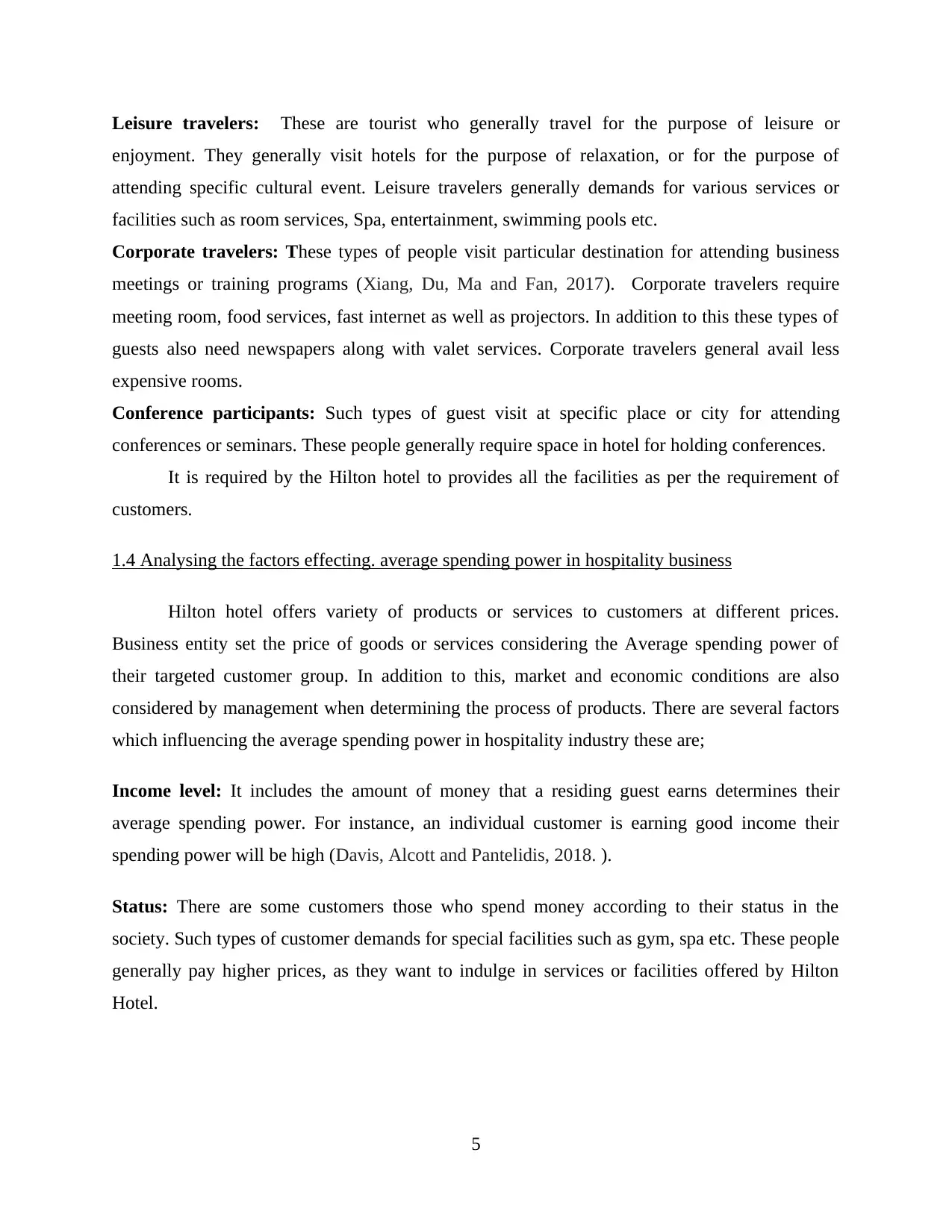
Leisure travelers: These are tourist who generally travel for the purpose of leisure or
enjoyment. They generally visit hotels for the purpose of relaxation, or for the purpose of
attending specific cultural event. Leisure travelers generally demands for various services or
facilities such as room services, Spa, entertainment, swimming pools etc.
Corporate travelers: These types of people visit particular destination for attending business
meetings or training programs (Xiang, Du, Ma and Fan, 2017). Corporate travelers require
meeting room, food services, fast internet as well as projectors. In addition to this these types of
guests also need newspapers along with valet services. Corporate travelers general avail less
expensive rooms.
Conference participants: Such types of guest visit at specific place or city for attending
conferences or seminars. These people generally require space in hotel for holding conferences.
It is required by the Hilton hotel to provides all the facilities as per the requirement of
customers.
1.4 Analysing the factors effecting. average spending power in hospitality business
Hilton hotel offers variety of products or services to customers at different prices.
Business entity set the price of goods or services considering the Average spending power of
their targeted customer group. In addition to this, market and economic conditions are also
considered by management when determining the process of products. There are several factors
which influencing the average spending power in hospitality industry these are;
Income level: It includes the amount of money that a residing guest earns determines their
average spending power. For instance, an individual customer is earning good income their
spending power will be high (Davis, Alcott and Pantelidis, 2018. ).
Status: There are some customers those who spend money according to their status in the
society. Such types of customer demands for special facilities such as gym, spa etc. These people
generally pay higher prices, as they want to indulge in services or facilities offered by Hilton
Hotel.
5
enjoyment. They generally visit hotels for the purpose of relaxation, or for the purpose of
attending specific cultural event. Leisure travelers generally demands for various services or
facilities such as room services, Spa, entertainment, swimming pools etc.
Corporate travelers: These types of people visit particular destination for attending business
meetings or training programs (Xiang, Du, Ma and Fan, 2017). Corporate travelers require
meeting room, food services, fast internet as well as projectors. In addition to this these types of
guests also need newspapers along with valet services. Corporate travelers general avail less
expensive rooms.
Conference participants: Such types of guest visit at specific place or city for attending
conferences or seminars. These people generally require space in hotel for holding conferences.
It is required by the Hilton hotel to provides all the facilities as per the requirement of
customers.
1.4 Analysing the factors effecting. average spending power in hospitality business
Hilton hotel offers variety of products or services to customers at different prices.
Business entity set the price of goods or services considering the Average spending power of
their targeted customer group. In addition to this, market and economic conditions are also
considered by management when determining the process of products. There are several factors
which influencing the average spending power in hospitality industry these are;
Income level: It includes the amount of money that a residing guest earns determines their
average spending power. For instance, an individual customer is earning good income their
spending power will be high (Davis, Alcott and Pantelidis, 2018. ).
Status: There are some customers those who spend money according to their status in the
society. Such types of customer demands for special facilities such as gym, spa etc. These people
generally pay higher prices, as they want to indulge in services or facilities offered by Hilton
Hotel.
5
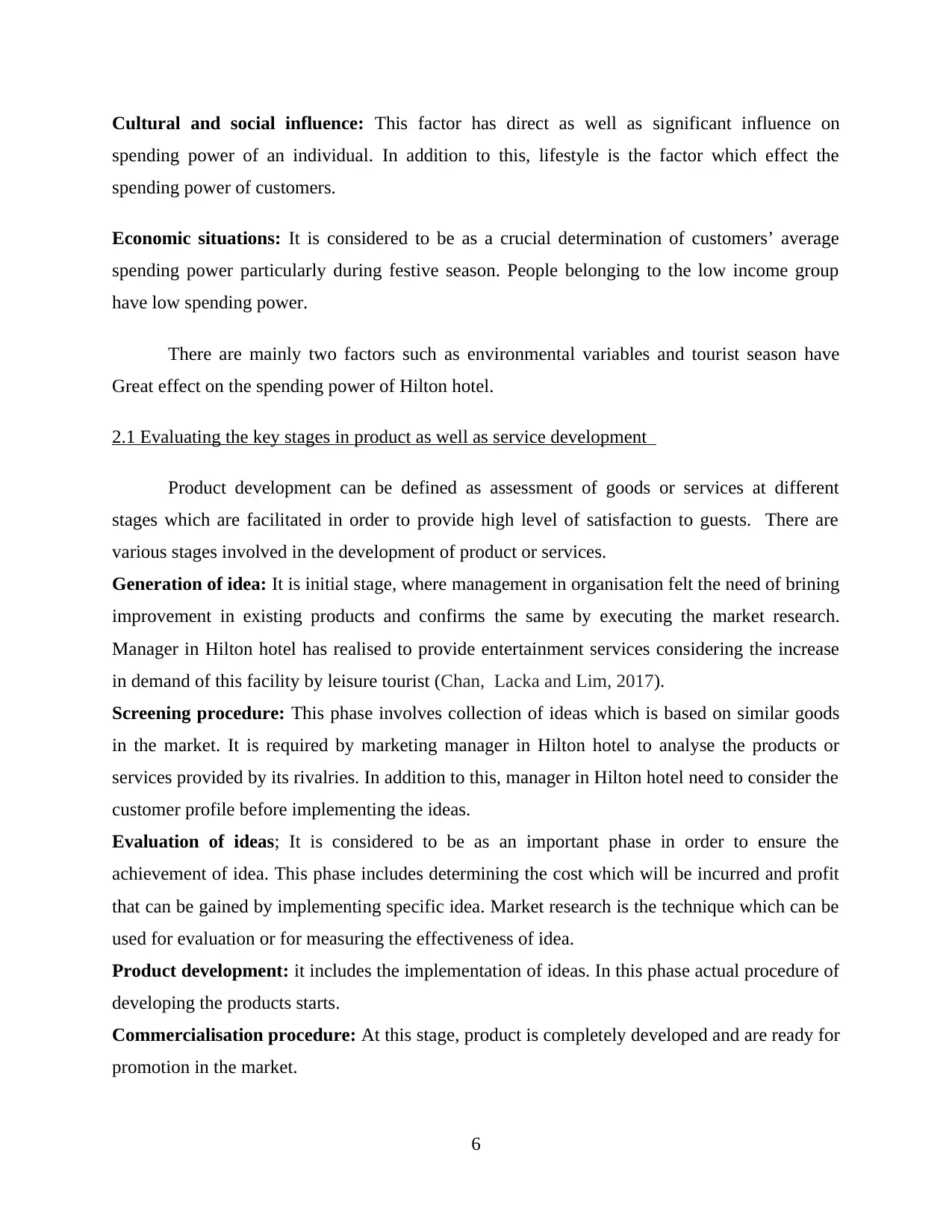
Cultural and social influence: This factor has direct as well as significant influence on
spending power of an individual. In addition to this, lifestyle is the factor which effect the
spending power of customers.
Economic situations: It is considered to be as a crucial determination of customers’ average
spending power particularly during festive season. People belonging to the low income group
have low spending power.
There are mainly two factors such as environmental variables and tourist season have
Great effect on the spending power of Hilton hotel.
2.1 Evaluating the key stages in product as well as service development
Product development can be defined as assessment of goods or services at different
stages which are facilitated in order to provide high level of satisfaction to guests. There are
various stages involved in the development of product or services.
Generation of idea: It is initial stage, where management in organisation felt the need of brining
improvement in existing products and confirms the same by executing the market research.
Manager in Hilton hotel has realised to provide entertainment services considering the increase
in demand of this facility by leisure tourist (Chan, Lacka and Lim, 2017).
Screening procedure: This phase involves collection of ideas which is based on similar goods
in the market. It is required by marketing manager in Hilton hotel to analyse the products or
services provided by its rivalries. In addition to this, manager in Hilton hotel need to consider the
customer profile before implementing the ideas.
Evaluation of ideas; It is considered to be as an important phase in order to ensure the
achievement of idea. This phase includes determining the cost which will be incurred and profit
that can be gained by implementing specific idea. Market research is the technique which can be
used for evaluation or for measuring the effectiveness of idea.
Product development: it includes the implementation of ideas. In this phase actual procedure of
developing the products starts.
Commercialisation procedure: At this stage, product is completely developed and are ready for
promotion in the market.
6
spending power of an individual. In addition to this, lifestyle is the factor which effect the
spending power of customers.
Economic situations: It is considered to be as a crucial determination of customers’ average
spending power particularly during festive season. People belonging to the low income group
have low spending power.
There are mainly two factors such as environmental variables and tourist season have
Great effect on the spending power of Hilton hotel.
2.1 Evaluating the key stages in product as well as service development
Product development can be defined as assessment of goods or services at different
stages which are facilitated in order to provide high level of satisfaction to guests. There are
various stages involved in the development of product or services.
Generation of idea: It is initial stage, where management in organisation felt the need of brining
improvement in existing products and confirms the same by executing the market research.
Manager in Hilton hotel has realised to provide entertainment services considering the increase
in demand of this facility by leisure tourist (Chan, Lacka and Lim, 2017).
Screening procedure: This phase involves collection of ideas which is based on similar goods
in the market. It is required by marketing manager in Hilton hotel to analyse the products or
services provided by its rivalries. In addition to this, manager in Hilton hotel need to consider the
customer profile before implementing the ideas.
Evaluation of ideas; It is considered to be as an important phase in order to ensure the
achievement of idea. This phase includes determining the cost which will be incurred and profit
that can be gained by implementing specific idea. Market research is the technique which can be
used for evaluation or for measuring the effectiveness of idea.
Product development: it includes the implementation of ideas. In this phase actual procedure of
developing the products starts.
Commercialisation procedure: At this stage, product is completely developed and are ready for
promotion in the market.
6
⊘ This is a preview!⊘
Do you want full access?
Subscribe today to unlock all pages.

Trusted by 1+ million students worldwide
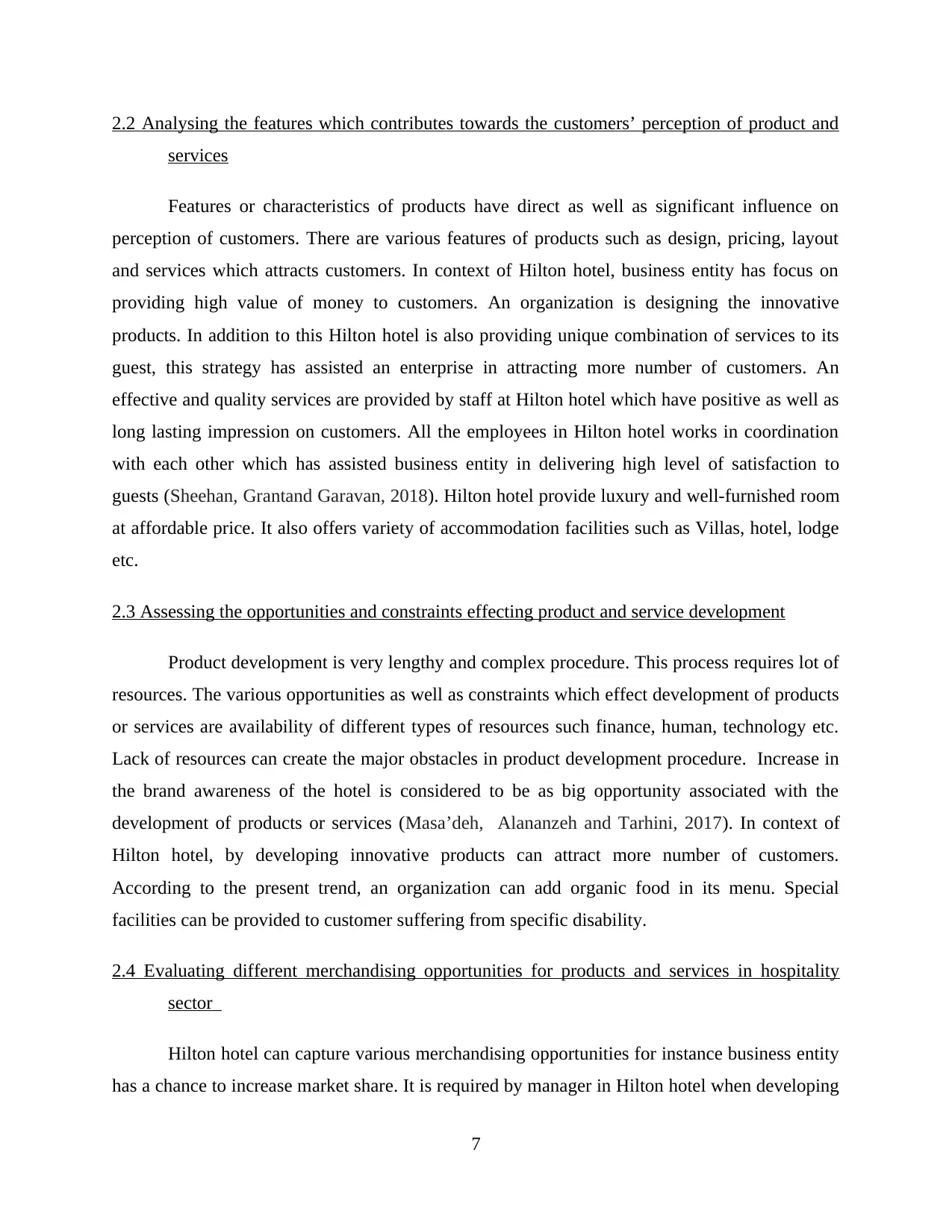
2.2 Analysing the features which contributes towards the customers’ perception of product and
services
Features or characteristics of products have direct as well as significant influence on
perception of customers. There are various features of products such as design, pricing, layout
and services which attracts customers. In context of Hilton hotel, business entity has focus on
providing high value of money to customers. An organization is designing the innovative
products. In addition to this Hilton hotel is also providing unique combination of services to its
guest, this strategy has assisted an enterprise in attracting more number of customers. An
effective and quality services are provided by staff at Hilton hotel which have positive as well as
long lasting impression on customers. All the employees in Hilton hotel works in coordination
with each other which has assisted business entity in delivering high level of satisfaction to
guests (Sheehan, Grantand Garavan, 2018). Hilton hotel provide luxury and well-furnished room
at affordable price. It also offers variety of accommodation facilities such as Villas, hotel, lodge
etc.
2.3 Assessing the opportunities and constraints effecting product and service development
Product development is very lengthy and complex procedure. This process requires lot of
resources. The various opportunities as well as constraints which effect development of products
or services are availability of different types of resources such finance, human, technology etc.
Lack of resources can create the major obstacles in product development procedure. Increase in
the brand awareness of the hotel is considered to be as big opportunity associated with the
development of products or services (Masa’deh, Alananzeh and Tarhini, 2017). In context of
Hilton hotel, by developing innovative products can attract more number of customers.
According to the present trend, an organization can add organic food in its menu. Special
facilities can be provided to customer suffering from specific disability.
2.4 Evaluating different merchandising opportunities for products and services in hospitality
sector
Hilton hotel can capture various merchandising opportunities for instance business entity
has a chance to increase market share. It is required by manager in Hilton hotel when developing
7
services
Features or characteristics of products have direct as well as significant influence on
perception of customers. There are various features of products such as design, pricing, layout
and services which attracts customers. In context of Hilton hotel, business entity has focus on
providing high value of money to customers. An organization is designing the innovative
products. In addition to this Hilton hotel is also providing unique combination of services to its
guest, this strategy has assisted an enterprise in attracting more number of customers. An
effective and quality services are provided by staff at Hilton hotel which have positive as well as
long lasting impression on customers. All the employees in Hilton hotel works in coordination
with each other which has assisted business entity in delivering high level of satisfaction to
guests (Sheehan, Grantand Garavan, 2018). Hilton hotel provide luxury and well-furnished room
at affordable price. It also offers variety of accommodation facilities such as Villas, hotel, lodge
etc.
2.3 Assessing the opportunities and constraints effecting product and service development
Product development is very lengthy and complex procedure. This process requires lot of
resources. The various opportunities as well as constraints which effect development of products
or services are availability of different types of resources such finance, human, technology etc.
Lack of resources can create the major obstacles in product development procedure. Increase in
the brand awareness of the hotel is considered to be as big opportunity associated with the
development of products or services (Masa’deh, Alananzeh and Tarhini, 2017). In context of
Hilton hotel, by developing innovative products can attract more number of customers.
According to the present trend, an organization can add organic food in its menu. Special
facilities can be provided to customer suffering from specific disability.
2.4 Evaluating different merchandising opportunities for products and services in hospitality
sector
Hilton hotel can capture various merchandising opportunities for instance business entity
has a chance to increase market share. It is required by manager in Hilton hotel when developing
7
Paraphrase This Document
Need a fresh take? Get an instant paraphrase of this document with our AI Paraphraser
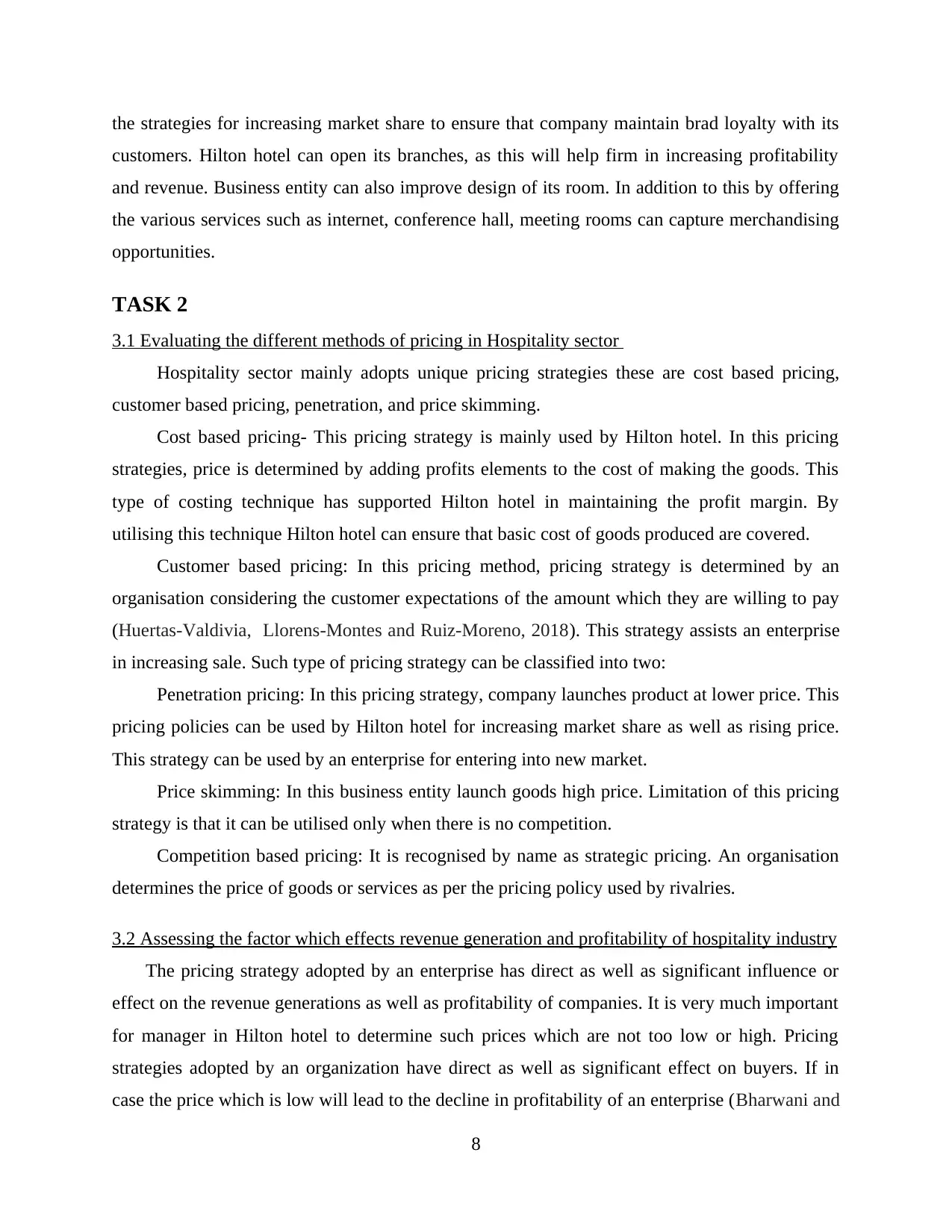
the strategies for increasing market share to ensure that company maintain brad loyalty with its
customers. Hilton hotel can open its branches, as this will help firm in increasing profitability
and revenue. Business entity can also improve design of its room. In addition to this by offering
the various services such as internet, conference hall, meeting rooms can capture merchandising
opportunities.
TASK 2
3.1 Evaluating the different methods of pricing in Hospitality sector
Hospitality sector mainly adopts unique pricing strategies these are cost based pricing,
customer based pricing, penetration, and price skimming.
Cost based pricing- This pricing strategy is mainly used by Hilton hotel. In this pricing
strategies, price is determined by adding profits elements to the cost of making the goods. This
type of costing technique has supported Hilton hotel in maintaining the profit margin. By
utilising this technique Hilton hotel can ensure that basic cost of goods produced are covered.
Customer based pricing: In this pricing method, pricing strategy is determined by an
organisation considering the customer expectations of the amount which they are willing to pay
(Huertas-Valdivia, Llorens-Montes and Ruiz-Moreno, 2018). This strategy assists an enterprise
in increasing sale. Such type of pricing strategy can be classified into two:
Penetration pricing: In this pricing strategy, company launches product at lower price. This
pricing policies can be used by Hilton hotel for increasing market share as well as rising price.
This strategy can be used by an enterprise for entering into new market.
Price skimming: In this business entity launch goods high price. Limitation of this pricing
strategy is that it can be utilised only when there is no competition.
Competition based pricing: It is recognised by name as strategic pricing. An organisation
determines the price of goods or services as per the pricing policy used by rivalries.
3.2 Assessing the factor which effects revenue generation and profitability of hospitality industry
The pricing strategy adopted by an enterprise has direct as well as significant influence or
effect on the revenue generations as well as profitability of companies. It is very much important
for manager in Hilton hotel to determine such prices which are not too low or high. Pricing
strategies adopted by an organization have direct as well as significant effect on buyers. If in
case the price which is low will lead to the decline in profitability of an enterprise (Bharwani and
8
customers. Hilton hotel can open its branches, as this will help firm in increasing profitability
and revenue. Business entity can also improve design of its room. In addition to this by offering
the various services such as internet, conference hall, meeting rooms can capture merchandising
opportunities.
TASK 2
3.1 Evaluating the different methods of pricing in Hospitality sector
Hospitality sector mainly adopts unique pricing strategies these are cost based pricing,
customer based pricing, penetration, and price skimming.
Cost based pricing- This pricing strategy is mainly used by Hilton hotel. In this pricing
strategies, price is determined by adding profits elements to the cost of making the goods. This
type of costing technique has supported Hilton hotel in maintaining the profit margin. By
utilising this technique Hilton hotel can ensure that basic cost of goods produced are covered.
Customer based pricing: In this pricing method, pricing strategy is determined by an
organisation considering the customer expectations of the amount which they are willing to pay
(Huertas-Valdivia, Llorens-Montes and Ruiz-Moreno, 2018). This strategy assists an enterprise
in increasing sale. Such type of pricing strategy can be classified into two:
Penetration pricing: In this pricing strategy, company launches product at lower price. This
pricing policies can be used by Hilton hotel for increasing market share as well as rising price.
This strategy can be used by an enterprise for entering into new market.
Price skimming: In this business entity launch goods high price. Limitation of this pricing
strategy is that it can be utilised only when there is no competition.
Competition based pricing: It is recognised by name as strategic pricing. An organisation
determines the price of goods or services as per the pricing policy used by rivalries.
3.2 Assessing the factor which effects revenue generation and profitability of hospitality industry
The pricing strategy adopted by an enterprise has direct as well as significant influence or
effect on the revenue generations as well as profitability of companies. It is very much important
for manager in Hilton hotel to determine such prices which are not too low or high. Pricing
strategies adopted by an organization have direct as well as significant effect on buyers. If in
case the price which is low will lead to the decline in profitability of an enterprise (Bharwani and
8
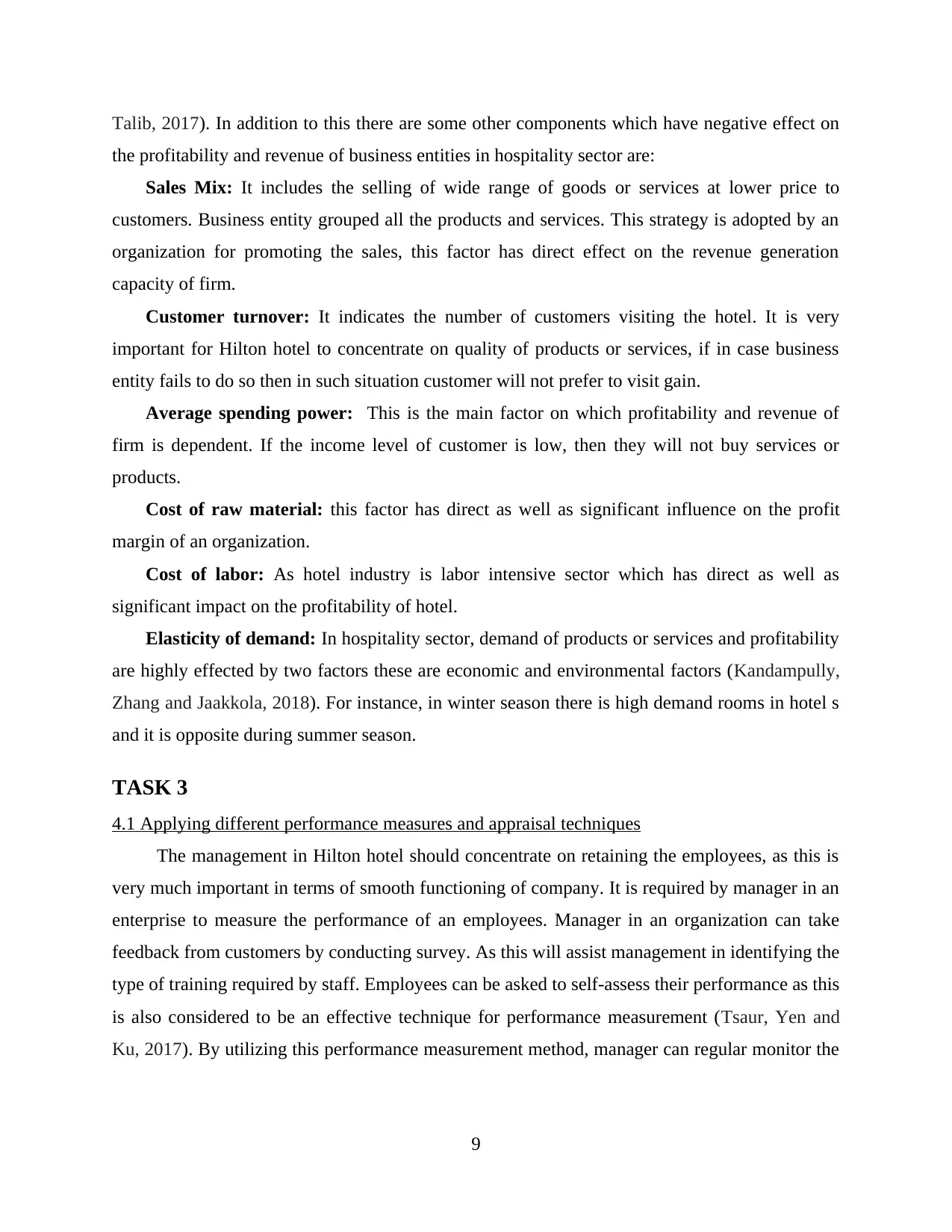
Talib, 2017). In addition to this there are some other components which have negative effect on
the profitability and revenue of business entities in hospitality sector are:
Sales Mix: It includes the selling of wide range of goods or services at lower price to
customers. Business entity grouped all the products and services. This strategy is adopted by an
organization for promoting the sales, this factor has direct effect on the revenue generation
capacity of firm.
Customer turnover: It indicates the number of customers visiting the hotel. It is very
important for Hilton hotel to concentrate on quality of products or services, if in case business
entity fails to do so then in such situation customer will not prefer to visit gain.
Average spending power: This is the main factor on which profitability and revenue of
firm is dependent. If the income level of customer is low, then they will not buy services or
products.
Cost of raw material: this factor has direct as well as significant influence on the profit
margin of an organization.
Cost of labor: As hotel industry is labor intensive sector which has direct as well as
significant impact on the profitability of hotel.
Elasticity of demand: In hospitality sector, demand of products or services and profitability
are highly effected by two factors these are economic and environmental factors (Kandampully,
Zhang and Jaakkola, 2018). For instance, in winter season there is high demand rooms in hotel s
and it is opposite during summer season.
TASK 3
4.1 Applying different performance measures and appraisal techniques
The management in Hilton hotel should concentrate on retaining the employees, as this is
very much important in terms of smooth functioning of company. It is required by manager in an
enterprise to measure the performance of an employees. Manager in an organization can take
feedback from customers by conducting survey. As this will assist management in identifying the
type of training required by staff. Employees can be asked to self-assess their performance as this
is also considered to be an effective technique for performance measurement (Tsaur, Yen and
Ku, 2017). By utilizing this performance measurement method, manager can regular monitor the
9
the profitability and revenue of business entities in hospitality sector are:
Sales Mix: It includes the selling of wide range of goods or services at lower price to
customers. Business entity grouped all the products and services. This strategy is adopted by an
organization for promoting the sales, this factor has direct effect on the revenue generation
capacity of firm.
Customer turnover: It indicates the number of customers visiting the hotel. It is very
important for Hilton hotel to concentrate on quality of products or services, if in case business
entity fails to do so then in such situation customer will not prefer to visit gain.
Average spending power: This is the main factor on which profitability and revenue of
firm is dependent. If the income level of customer is low, then they will not buy services or
products.
Cost of raw material: this factor has direct as well as significant influence on the profit
margin of an organization.
Cost of labor: As hotel industry is labor intensive sector which has direct as well as
significant impact on the profitability of hotel.
Elasticity of demand: In hospitality sector, demand of products or services and profitability
are highly effected by two factors these are economic and environmental factors (Kandampully,
Zhang and Jaakkola, 2018). For instance, in winter season there is high demand rooms in hotel s
and it is opposite during summer season.
TASK 3
4.1 Applying different performance measures and appraisal techniques
The management in Hilton hotel should concentrate on retaining the employees, as this is
very much important in terms of smooth functioning of company. It is required by manager in an
enterprise to measure the performance of an employees. Manager in an organization can take
feedback from customers by conducting survey. As this will assist management in identifying the
type of training required by staff. Employees can be asked to self-assess their performance as this
is also considered to be an effective technique for performance measurement (Tsaur, Yen and
Ku, 2017). By utilizing this performance measurement method, manager can regular monitor the
9
⊘ This is a preview!⊘
Do you want full access?
Subscribe today to unlock all pages.

Trusted by 1+ million students worldwide
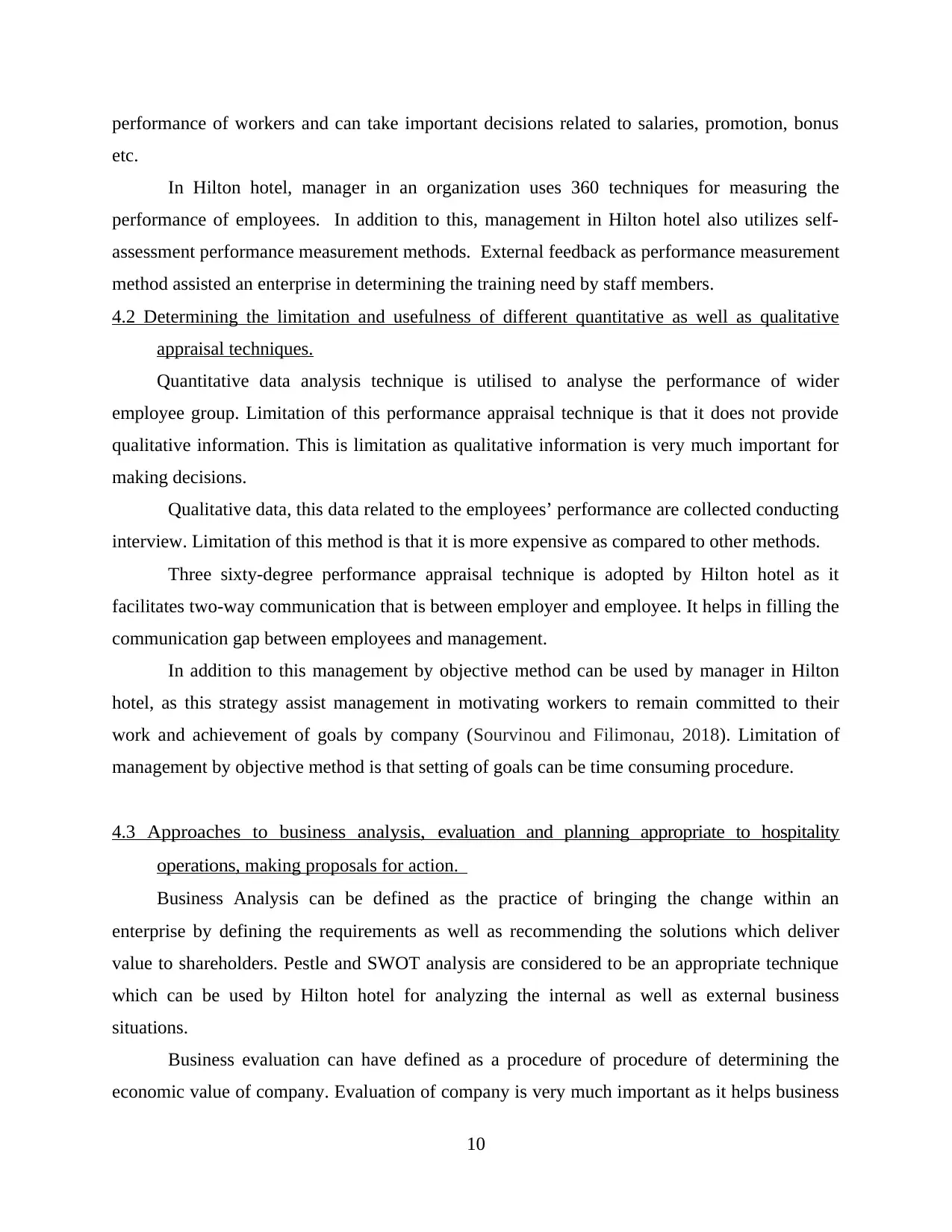
performance of workers and can take important decisions related to salaries, promotion, bonus
etc.
In Hilton hotel, manager in an organization uses 360 techniques for measuring the
performance of employees. In addition to this, management in Hilton hotel also utilizes self-
assessment performance measurement methods. External feedback as performance measurement
method assisted an enterprise in determining the training need by staff members.
4.2 Determining the limitation and usefulness of different quantitative as well as qualitative
appraisal techniques.
Quantitative data analysis technique is utilised to analyse the performance of wider
employee group. Limitation of this performance appraisal technique is that it does not provide
qualitative information. This is limitation as qualitative information is very much important for
making decisions.
Qualitative data, this data related to the employees’ performance are collected conducting
interview. Limitation of this method is that it is more expensive as compared to other methods.
Three sixty-degree performance appraisal technique is adopted by Hilton hotel as it
facilitates two-way communication that is between employer and employee. It helps in filling the
communication gap between employees and management.
In addition to this management by objective method can be used by manager in Hilton
hotel, as this strategy assist management in motivating workers to remain committed to their
work and achievement of goals by company (Sourvinou and Filimonau, 2018). Limitation of
management by objective method is that setting of goals can be time consuming procedure.
4.3 Approaches to business analysis, evaluation and planning appropriate to hospitality
operations, making proposals for action.
Business Analysis can be defined as the practice of bringing the change within an
enterprise by defining the requirements as well as recommending the solutions which deliver
value to shareholders. Pestle and SWOT analysis are considered to be an appropriate technique
which can be used by Hilton hotel for analyzing the internal as well as external business
situations.
Business evaluation can have defined as a procedure of procedure of determining the
economic value of company. Evaluation of company is very much important as it helps business
10
etc.
In Hilton hotel, manager in an organization uses 360 techniques for measuring the
performance of employees. In addition to this, management in Hilton hotel also utilizes self-
assessment performance measurement methods. External feedback as performance measurement
method assisted an enterprise in determining the training need by staff members.
4.2 Determining the limitation and usefulness of different quantitative as well as qualitative
appraisal techniques.
Quantitative data analysis technique is utilised to analyse the performance of wider
employee group. Limitation of this performance appraisal technique is that it does not provide
qualitative information. This is limitation as qualitative information is very much important for
making decisions.
Qualitative data, this data related to the employees’ performance are collected conducting
interview. Limitation of this method is that it is more expensive as compared to other methods.
Three sixty-degree performance appraisal technique is adopted by Hilton hotel as it
facilitates two-way communication that is between employer and employee. It helps in filling the
communication gap between employees and management.
In addition to this management by objective method can be used by manager in Hilton
hotel, as this strategy assist management in motivating workers to remain committed to their
work and achievement of goals by company (Sourvinou and Filimonau, 2018). Limitation of
management by objective method is that setting of goals can be time consuming procedure.
4.3 Approaches to business analysis, evaluation and planning appropriate to hospitality
operations, making proposals for action.
Business Analysis can be defined as the practice of bringing the change within an
enterprise by defining the requirements as well as recommending the solutions which deliver
value to shareholders. Pestle and SWOT analysis are considered to be an appropriate technique
which can be used by Hilton hotel for analyzing the internal as well as external business
situations.
Business evaluation can have defined as a procedure of procedure of determining the
economic value of company. Evaluation of company is very much important as it helps business
10
Paraphrase This Document
Need a fresh take? Get an instant paraphrase of this document with our AI Paraphraser
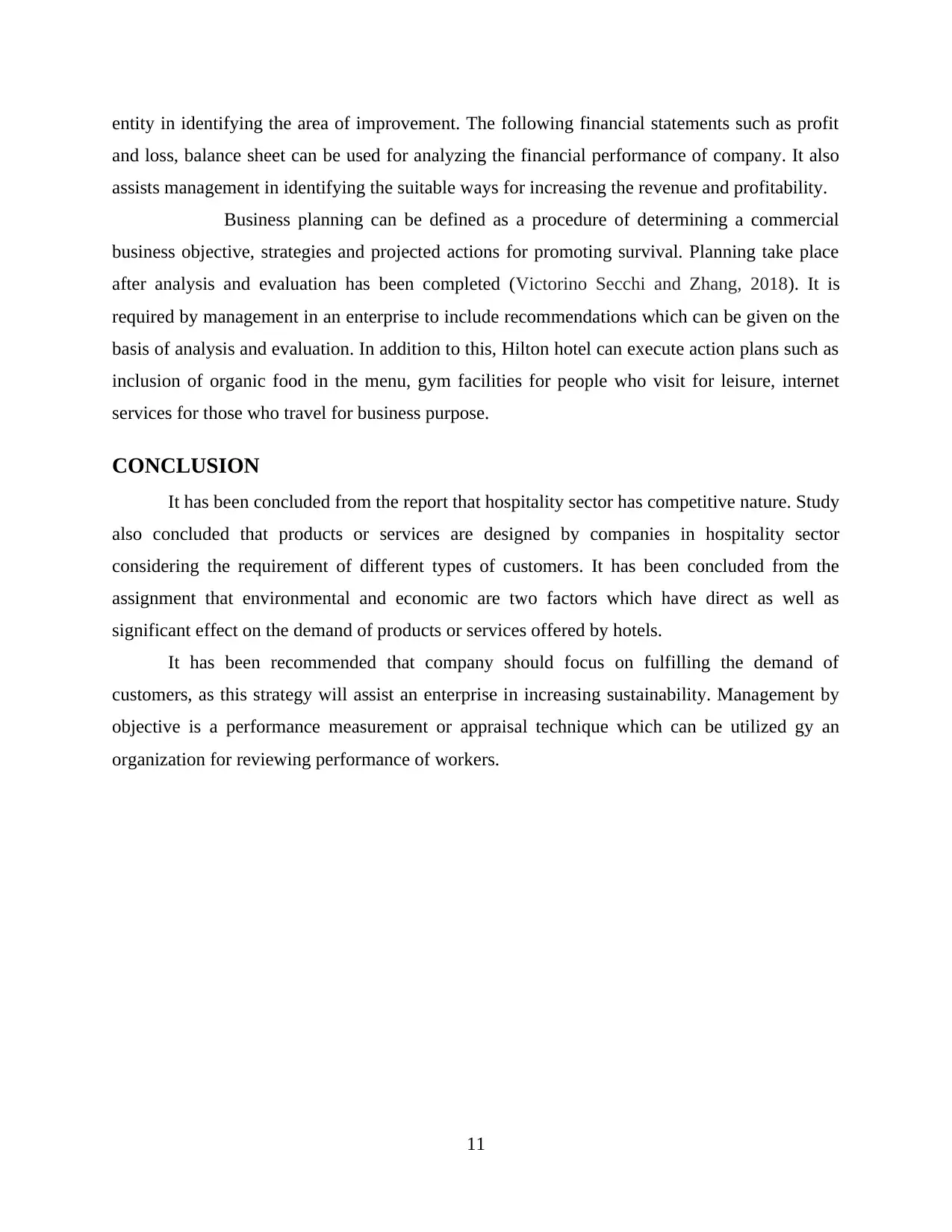
entity in identifying the area of improvement. The following financial statements such as profit
and loss, balance sheet can be used for analyzing the financial performance of company. It also
assists management in identifying the suitable ways for increasing the revenue and profitability.
Business planning can be defined as a procedure of determining a commercial
business objective, strategies and projected actions for promoting survival. Planning take place
after analysis and evaluation has been completed (Victorino Secchi and Zhang, 2018). It is
required by management in an enterprise to include recommendations which can be given on the
basis of analysis and evaluation. In addition to this, Hilton hotel can execute action plans such as
inclusion of organic food in the menu, gym facilities for people who visit for leisure, internet
services for those who travel for business purpose.
CONCLUSION
It has been concluded from the report that hospitality sector has competitive nature. Study
also concluded that products or services are designed by companies in hospitality sector
considering the requirement of different types of customers. It has been concluded from the
assignment that environmental and economic are two factors which have direct as well as
significant effect on the demand of products or services offered by hotels.
It has been recommended that company should focus on fulfilling the demand of
customers, as this strategy will assist an enterprise in increasing sustainability. Management by
objective is a performance measurement or appraisal technique which can be utilized gy an
organization for reviewing performance of workers.
11
and loss, balance sheet can be used for analyzing the financial performance of company. It also
assists management in identifying the suitable ways for increasing the revenue and profitability.
Business planning can be defined as a procedure of determining a commercial
business objective, strategies and projected actions for promoting survival. Planning take place
after analysis and evaluation has been completed (Victorino Secchi and Zhang, 2018). It is
required by management in an enterprise to include recommendations which can be given on the
basis of analysis and evaluation. In addition to this, Hilton hotel can execute action plans such as
inclusion of organic food in the menu, gym facilities for people who visit for leisure, internet
services for those who travel for business purpose.
CONCLUSION
It has been concluded from the report that hospitality sector has competitive nature. Study
also concluded that products or services are designed by companies in hospitality sector
considering the requirement of different types of customers. It has been concluded from the
assignment that environmental and economic are two factors which have direct as well as
significant effect on the demand of products or services offered by hotels.
It has been recommended that company should focus on fulfilling the demand of
customers, as this strategy will assist an enterprise in increasing sustainability. Management by
objective is a performance measurement or appraisal technique which can be utilized gy an
organization for reviewing performance of workers.
11
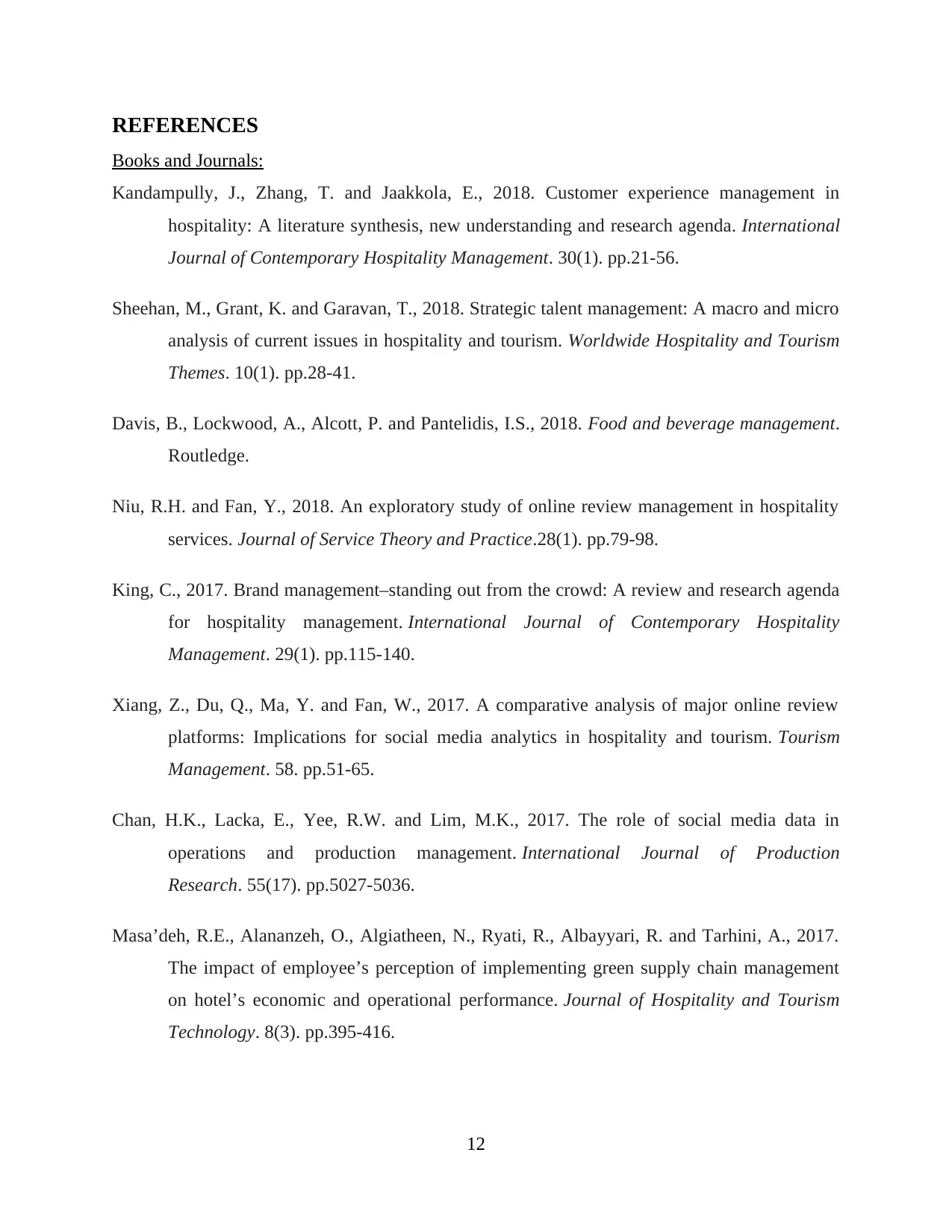
REFERENCES
Books and Journals:
Kandampully, J., Zhang, T. and Jaakkola, E., 2018. Customer experience management in
hospitality: A literature synthesis, new understanding and research agenda. International
Journal of Contemporary Hospitality Management. 30(1). pp.21-56.
Sheehan, M., Grant, K. and Garavan, T., 2018. Strategic talent management: A macro and micro
analysis of current issues in hospitality and tourism. Worldwide Hospitality and Tourism
Themes. 10(1). pp.28-41.
Davis, B., Lockwood, A., Alcott, P. and Pantelidis, I.S., 2018. Food and beverage management.
Routledge.
Niu, R.H. and Fan, Y., 2018. An exploratory study of online review management in hospitality
services. Journal of Service Theory and Practice.28(1). pp.79-98.
King, C., 2017. Brand management–standing out from the crowd: A review and research agenda
for hospitality management. International Journal of Contemporary Hospitality
Management. 29(1). pp.115-140.
Xiang, Z., Du, Q., Ma, Y. and Fan, W., 2017. A comparative analysis of major online review
platforms: Implications for social media analytics in hospitality and tourism. Tourism
Management. 58. pp.51-65.
Chan, H.K., Lacka, E., Yee, R.W. and Lim, M.K., 2017. The role of social media data in
operations and production management. International Journal of Production
Research. 55(17). pp.5027-5036.
Masa’deh, R.E., Alananzeh, O., Algiatheen, N., Ryati, R., Albayyari, R. and Tarhini, A., 2017.
The impact of employee’s perception of implementing green supply chain management
on hotel’s economic and operational performance. Journal of Hospitality and Tourism
Technology. 8(3). pp.395-416.
12
Books and Journals:
Kandampully, J., Zhang, T. and Jaakkola, E., 2018. Customer experience management in
hospitality: A literature synthesis, new understanding and research agenda. International
Journal of Contemporary Hospitality Management. 30(1). pp.21-56.
Sheehan, M., Grant, K. and Garavan, T., 2018. Strategic talent management: A macro and micro
analysis of current issues in hospitality and tourism. Worldwide Hospitality and Tourism
Themes. 10(1). pp.28-41.
Davis, B., Lockwood, A., Alcott, P. and Pantelidis, I.S., 2018. Food and beverage management.
Routledge.
Niu, R.H. and Fan, Y., 2018. An exploratory study of online review management in hospitality
services. Journal of Service Theory and Practice.28(1). pp.79-98.
King, C., 2017. Brand management–standing out from the crowd: A review and research agenda
for hospitality management. International Journal of Contemporary Hospitality
Management. 29(1). pp.115-140.
Xiang, Z., Du, Q., Ma, Y. and Fan, W., 2017. A comparative analysis of major online review
platforms: Implications for social media analytics in hospitality and tourism. Tourism
Management. 58. pp.51-65.
Chan, H.K., Lacka, E., Yee, R.W. and Lim, M.K., 2017. The role of social media data in
operations and production management. International Journal of Production
Research. 55(17). pp.5027-5036.
Masa’deh, R.E., Alananzeh, O., Algiatheen, N., Ryati, R., Albayyari, R. and Tarhini, A., 2017.
The impact of employee’s perception of implementing green supply chain management
on hotel’s economic and operational performance. Journal of Hospitality and Tourism
Technology. 8(3). pp.395-416.
12
⊘ This is a preview!⊘
Do you want full access?
Subscribe today to unlock all pages.

Trusted by 1+ million students worldwide
1 out of 13
Related Documents
Your All-in-One AI-Powered Toolkit for Academic Success.
+13062052269
info@desklib.com
Available 24*7 on WhatsApp / Email
![[object Object]](/_next/static/media/star-bottom.7253800d.svg)
Unlock your academic potential
Copyright © 2020–2025 A2Z Services. All Rights Reserved. Developed and managed by ZUCOL.





